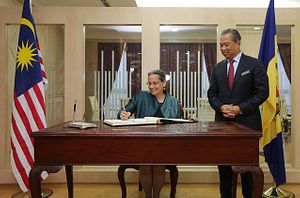On March 1, Muhyiddin Yassin was officially appointed as Malaysia’s eighth prime minister after a week of political uncertainty in the Southeast Asian state. While Muhyiddin’s position is far from unchallenged at this point and the future direction of Malaysia’s politics is still unclear, his rise to the premiership has nonetheless brought to the fore the question of what his reign could mean for Malaysia’s domestic politics and foreign policy.
As I have noted before in these pages, this week has been one of the most turbulent in Malaysia’s politics, with rising speculation about transition dynamics between returning premier Mahathir Mohamad and his former deputy prime minister turned opposition leader turned premier in waiting Anwar Ibrahim in the Pakatan Harapan (PH) coalition that came to power in the 2018 elections coming to a head with a series of political realignments that effectively saw the end of PH’s time in power and doubts about who would be forming a new government subsequently.
On March 1, after much speculation, Muhyiddin Yassin, a former deputy prime minister to ousted premier Najib Razak and subsequent chair of Bersatu with Mahathir, was appointed Malaysia’s eighth premier by the country’s king. Muhyiddin’s appointment occurred in the face of protests by opponents who noted that a new government led by Muhyiddin would not have an electoral mandate, and that the return of UMNO to power would go against the spirit of the results of the 2018 elections which saw the unprecedented ousting of the country’s ruling party. At the time of writing, Muhyiddin’s position is far from unchallenged, with the potential for moves such as a no-confidence motion tabled in parliament next week still not out of the question.
But if Muhyiddin’s premiership does continue as mentioned, it would have significance for Malaysia’s domestic politics and foreign policy. On domestic politics, beyond the fact that a Muhyiddin government may face issues of legitimacy due to the aforementioned grievances that will need to be addressed in some way, the key question is how this may affect the reforms promised under the PH government, and intensify the worries already expressed about whether the hopes for a ‘New Malaysia’ were giving way to the realities of the ‘Same Old Malaysia.’ Even before Muhyiddin had been sworn in, PH officials including Anwar himself had been warning that any political realignment of this sort would threaten the reforms PH had set out. And while one should be cautious about assuming that any politician’s past can predict what he or she may do in the future amid changing political realities, Muhyiddin’s record as an ardent Malay nationalist may raise doubts about his commitment to inclusive, multiracial politics.
On foreign and defense policy, Muhyiddin’s premiership raises the question of how he would depart from the policies and official documents we have seen play out thus far under the PH government, including the Foreign Policy Framework and the Defense White Paper. To be sure, we are likely to see some continuity given the general alignment on priorities in this realm relative to domestic politics, the structural constraints and realities Malaysia faces, as well as Muyhiddin’s own involvement in such issues in the PH government as home minister, where he had played a role on security issues such as counterterrorism and maritime security and had paid overseas visits including to the United States. But the more interesting question is where we might see change – while he is a longtime politician, his views are not as fully formed or rigid as Mahathir’s, and we have yet to see confirmation of his cabinet lineup as well as how this will affect the lower levels of specific ministries.
To be sure, with so much still uncertain in Malaysia’s politics, it is difficult to say if Muhyiddin will stay on as prime minister, let alone predict the exact course that he may adopt in Malaysia’s domestic politics and foreign policy. Nonetheless, as the dust continues to settle from a turbulent period in Malaysia’s politics, one can expect that more observers will be asking this question about his reign should he in fact continue assuming the premiership in the months and years to come.
































